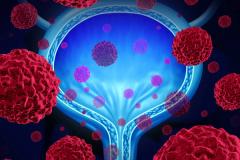
Systemic Therapy for Cisplatin-Ineligible Patients With Bladder Cancer
Expert perspectives on first-line treatment options available to patients with advanced bladder cancer who are ineligible for cisplatin-based chemotherapy.
Episodes in this series

Transcript:
Petros Grivas, MD, PhD: Nerina, we deal with these patients in the clinic every day. For cisplatin-ineligible patients, based on the criteria you very nicely outlined, we have 3 options. We have carboplatin and gemcitabine, and we can talk about maintenance available in a second. As of April, we have pembrolizumab plus enfortumab as an option based on the accelerated approval by the FDA for cisplatin-ineligible patients. And of course, we have clinical trials, which are my 2 favorite words. Always think about clinical trials. [Do you have] any comments about that clinical decision-making? Obviously, the shortcuts may be relevant here. If you don’t have a drug, you go to the other combo. But I have given pembrolizumab–EV [enfortumab vedotin] in clinical practice to a few patients of trial. Any comments or considerations on toxicity profile, medical comorbidities, or neuropathy that come to mind when we try to make this decision?
Nerina T. McDonald, PA-C: As you were saying, it’s a case-by-case basis [depending on] how the patient is coming into therapy and what their goals of care and priorities are. If a patient already has some degree of underlying neuropathy or uncontrolled diabetes, then maybe enfortumab isn’t a great option for them. But in most contexts, the pembrolizumab–EV [enfortumab vedotin] route is a great way to go.
Petros Grivas, MD, PhD: I agree. Especially for patients with explosive disease and visceral metastases, you’re trying to achieve a response. The response rate with pembrolizumab–EV [enfortumab vedotin] is about 65% or so. Carboplatin-gemcitabine is about 40%, 42%. Not to compare them directly, but if you want to go for a response, pembrolizumab–EV [enfortumab vedotin] is a great option for cisplatin-ineligible patients. Nerina, we have this trial open, the EV-302, that compares platinum gemcitabine chemotherapy vs pembrolizumab–EV [enfortumab vedotin]. We’re excited to see the data from that trial and how patients are holding.
Nerina T. McDonald, PA-C: Right.
Petros Grivas, MD, PhD: It’s very interesting. Lisa, [do you have] any comments about that decision-making, pembrolizumab–EV [enfortumab vedotin] vs carboplatin-gemcitabine? It’s an ongoing debate at conferences.
Lisa Adams, PA-C: Definitely. My feeling about which patients may be interested in up-front carboplatin-gemcitabine or cisplatin-gemcitabine is that the fixed time frame of cytotoxic chemotherapy is 4 to 6 cycles. With pembrolizumab–EV [enfortumab vedotin], they might have cumulative toxicities from being on it until progression or toxicity. Thinking about that, maybe the limited time point of platinum-based chemotherapy is more attractive for some patients.
Petros Grivas, MD, PhD: Thank you, Lisa. It’s an interesting discussion with the patients as well as multifactorial.
Transcript edited for clarity.
Newsletter
Stay up to date on recent advances in the multidisciplinary approach to cancer.







































